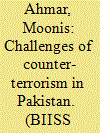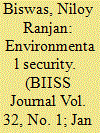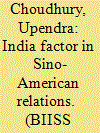|
|
|
Sort Order |
|
|
|
Items / Page
|
|
|
|
|
|
|
| Srl | Item |
| 1 |
ID:
108876


|
|
|
|
|
| Publication |
2011.
|
| Summary/Abstract |
Counter terrorism is not only a forceful response to the acts of terror, but also means a comprehensive combination of hard and soft power. The use of military or semi-military means to counter terrorism is one way to prevent the further loss of innocent lives but in order to effectively deal with the threat of terror, the application of social, psychological, economic and political means are also essential. This paper will take into account six important factors which cause the outbreak of violence and terrorism in Pakistan and the question of successes and failures of counter terrorism strategy. First, inter and intra-sectarian conflict; second, growing militancy in younger generation; third, the role of autonomous and secessionist groups particularly in Balochistan; fourth, army's bewildered approach on dealing with the threat of terror; fifth, media's role in curbing the incidents of terrorism and finally, the level of awareness or the lack of awareness which exists in Pakistan on the growing power of non-state actors who are in present circumstances responsible for the bulk of violent and terrorist acts in the country.
|
|
|
|
|
|
|
|
|
|
|
|
|
|
|
|
| 2 |
ID:
108873


|
|
|
|
|
| Publication |
2011.
|
| Summary/Abstract |
The evolving concepts of environmental security are debated in the discourse of security studies. Major theoretical paradigms of international relations have been quite successful to interpret the practical security problems arising from environmental and climatic changes. Academics and practitioners have started exploring the security implications of the changes at various levels. This paper explores how environmental degradation poses significant challenges to security. It reviews both traditional and nontraditional schools of thought of security studies. The paper examines the conceptual linkages between environment and security, focusing on the contributions of the constructivist school of thought in the construction of the idea of environmental security. It also examines the contribution of other schools, and acknowledges the importance of environment-threat-vulnerability framework that establishes the relationship between environmental degradation and potential conflicts. It works with a small set of empirical information to explain the prevalence and effects of ecological degradation and climate change, and national and international policy responses to address the threats. This paper concludes that environment is a significant threat to security.
|
|
|
|
|
|
|
|
|
|
|
|
|
|
|
|
| 3 |
ID:
108874


|
|
|
|
|
| Publication |
2011.
|
| Summary/Abstract |
COP16 of the UNFCCC at Cancun is regarded as a success, compared to the frustrating outcome at Copenhagen. However, the success part relates only to several issues of adaptation. The frustrating aspect is the mitigation part of the regime, which is the ultimate solution, but it remains as intractable as ever. This paper raises few queries including why there were some successes in adaptation, and not any in mitigation. The author argues that nothing positive in this regard at Cancun or any likelihood of its progress in the foreseeable future prodded the industrial countries to agree to some positive steps in adaptation. Still important issues regarding climate finance remain unresolved. Further, a realpolitik approach to upholding national interests and adherence to conventional sense of sovereignty by the major emitters, particularly by the US, stand in the way. The paper ends with a few suggestions on how to put pressure on the emission powers to listen to the call of the day.
|
|
|
|
|
|
|
|
|
|
|
|
|
|
|
|
| 4 |
ID:
108875


|
|
|
|
|
| Publication |
2011.
|
| Summary/Abstract |
As India rises as a major world power, two divergent perceptions are beginning to dominate the policy-making circles in both China and the US. According to the Chinese, India's recent behaviour clearly proves that it is joining an anti-China alliance with the United States and the Americans are recruiting the Indian tiger to hedge against the rising Chinese dragon. The US India nuclear deal and the warming strategic relationship between the two countries are in this context viewed as part of Washington's global strategic calculations. The Americans on the other hand, are worried of the recent warming of Sino-Indian relationship such as improving economic and trade ties, closer coordination on some common global issues, more frequent diplomatic exchanges and the emergence of a Russia-China-India axis that could counter the alleged US hegemony in the world. This paper examines the merits of these perceptions and explores the reasons why, contrary to common perceptions, India would continue to follow an independent foreign policy posture towards both the US and China.
|
|
|
|
|
|
|
|
|
|
|
|
|
|
|
|
| 5 |
ID:
108872


|
|
|
|
|
| Publication |
2011.
|
| Summary/Abstract |
Since the establishment of diplomatic relations, Bangladesh and China have developed robust bilateral cooperation based on mutual trust and interests. The most inspiring feature of Sino-Bangladesh relationship is its relative stability and continuity. Nevertheless, the trade deficit between the two countries has been a key concern for Bangladesh. From a different perspective, the Indian apprehension about the growing Sino-Bangladesh cooperation also worries Bangladesh. Bangladesh's efforts to promote relations with China are viewed by some Indians as unsettling for Indian interests in this region. Such apprehensions may put a kind of psychological pressure on Bangladesh to follow a cautious approach while dealing with China. This paper argues that both China and Bangladesh need to work together to implement various strategies to reduce the existing trade gap. It also argues that Bangladesh should not pursue any policy for promoting its friendly relations with India at the cost of its relations with China and vice versa. It is in this backdrop, this paper attempts to explore the existing Sino-Bangladesh bilateral relations, potential areas for further cooperation and also the Indian perceptions of the relations.
|
|
|
|
|
|
|
|
|
|
|
|
|
|
|
|
|
|
|
|
|